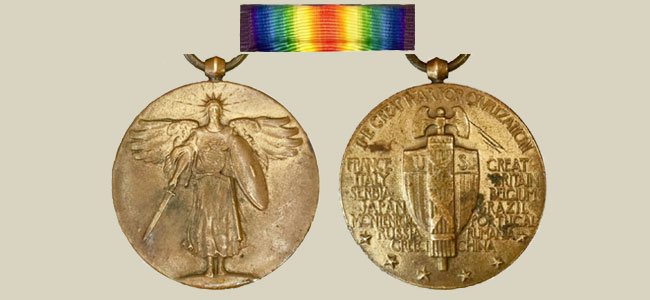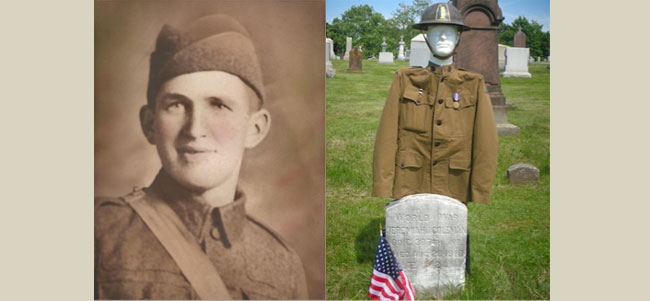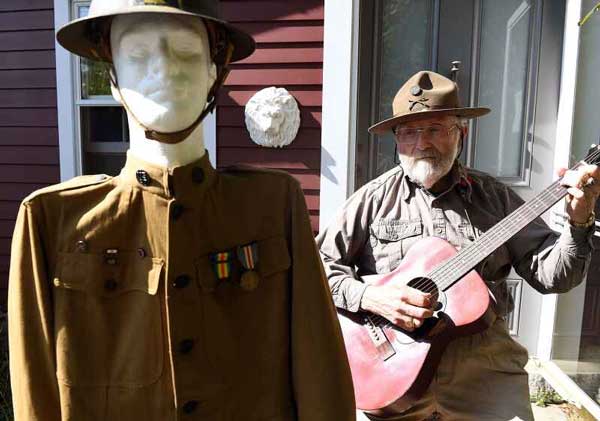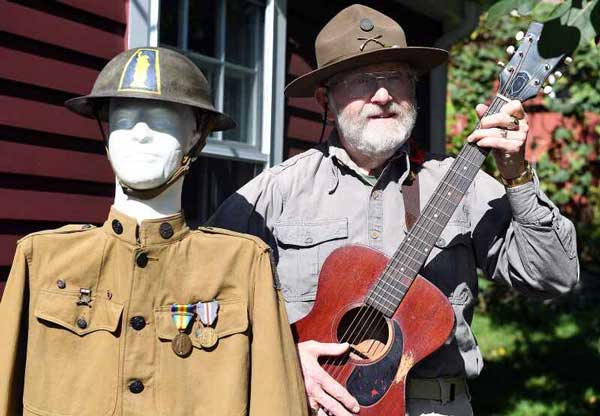|
Over Here & Over There:
Songs From And About The Great War (WWI)
Presented By Tom Callinan

Victory Medal (front + back) and ribbon (above) from World War I
(a.k.a. "The Great War For Civilization")
In honor of the Centennial of the United States' active involvement in World War I (1917), Tom Callinan, designated Connecticut's 1 st Official State Troubadour in 1991, has developed a program of diverse songs from and about World War I.

Post-War Commemorative Watch Fob (front + back)
Interspersed with the music, and through the prism of history, Mr. Callinan weaves a narrative regarding some of the contributing factors, which made "The War To End All Wars" the first modern war. Prior to President Wilson's request to Congress for a Declaration Of War in 1917, the slaughter had dragged on for nearly 3 years, killing many millions of combatants and civilians. Although the United States had adopted an official position of isolationism, it maintained transatlantic trade with our allies in Europe. However, with continued German U-Boat attacks on merchant and passenger shipping and other factors at home and abroad, the veil of neutrality inevitably fell, and the United States committed her nation's blood and treasure to the fray – initially with a volunteer military, and then a draft.

American Expeditionary Forces, A. E. F.
The songs in Tom's program represent a mixture of moods: patriotic songs that accompanied the troops marching off to war, full of exuberance and bravado; popular songs from the music halls, and Tin Pan Alley; songs of farewell; others that dealt with the loss of innocence, resulting from the soldiers' time spent overseas; the most popular anti-war song of the period; and contemporary, retrospective songs. Among the latter group is Tom's original composition, "Searching For Great-Uncle Jerry", written in honor of his late great-uncle Jeremiah J. Coleman, who was killed in action in France in 1918.

Private Jeremiah J. Coleman
Interred at St. John's Cemetery
Middletown, Connecticut
|
Gravestone Inscription: Jeremiah J. Coleman
Co. G • 307 th Infantry Regiment *
77 th Infantry Division
Died August 23, 1918
Chateau Thierry, France • Age 24 |
January edition of The Dispatch ,
bulletin of The Doughboy Foundation and the National World War I Centennial Commission
https://content.govdelivery.com/accounts/USWWICC/bulletins/3032421
|
Tom Callinan's entertaining and informative narrative style brings audiences of all ages into the performance with catchy choruses, interesting anecdotes, and an assortment of musical instruments from the string, wind, and percussion families. |

Former state Troubadour Tom Callinan to perform at National WWI Memorial dedication

Tom Callinan poses for a portrait with a mannequin dressed as his great-uncle Jeremiah Coleman at his home in Norwich, Wednesday, Sept. 11, 2024. The folk singer is visiting Washington D.C. this weekend as part of a dedication of a new World War I memorial, in which Coleman was killed. (Sarah Gordon/The Day)
Buy Photo Reprints
By Claire Bessette c.bessette@theday.com
Day Staff Writer
September 12, 2024 4:26 pm • Last Updated: September 12, 2024 7:09 pm
Norwich ? Former state Troubadour Tom Callinan will have a traveling companion in the car when he drives to Washington, D.C., on Friday to perform at this weekend's dedication of the new World War I memorial.
But the passenger will not be conversing or sharing driving duties on the long trip. Callinan is bringing a mannequin dressed as his great-uncle, Jeremiah Coleman of Middletown, an American soldier who was killed in action in Chateau Thierry in France in 1918 at age 24.
The mannequin wears an authentic WWI uniform with a patch from Coleman's division and a helmet decorated with a handpainted illustration of the Statue of Liberty, same as great-uncle Jerry wore in a photo Callinan's family held dear.
Callinan, a prolific songwriter about all things Connecticut, was invited by The Doughboy Foundation ? a lead sponsor of the World War I Living History Weekend that runs Friday through Sunday ? to perform two sets of WWI-themed songs at the memorial dedication events on Saturday. U.S. infantrymen in WWI were nicknamed doughboys, a term still used today for them.
The National World War I Memorial has been decades in the making. The centerpiece is a 58-foot-long bronze sculpture frieze titled, “A Soldier's Journey.” From left to right, with 38 different figures, it depicts a soldier leaving his wife and daughter, marching to war, engulfed in battle, with fallen comrades around him and then returning home.
“Great-uncle Jerry”
Callinan has penned songs about Norwich soldiers killed in WWI, one about a captured World War I German artillery cannon Norwich received after the war, one about the famous New Haven war hero dog, Sgt. Stubby, another about Gold Star families, and of course, a song about great uncle Jerry.
His song, “Searching for Great-Uncle Jerry” recounts how Callinan researched his ancestor, obtained Coleman's 307th Infantry Regiment, 77th Division records and even found his draft card online.
Seeing that signature, Callinan said, and wrote in his song, helped bring his great-uncle to life. Coleman was the brother of Callinan's mother's aunt, Mary Donahue.
“My mom was very close to her,” Callinan said of his great-aunt Mary. “We would go there all the time, and there was always this picture of Uncle Jerry on the wall. He was always present even though he died in World War I in 1918.”
In the refrain of his song, Callinan sings:
“Great-Uncle Jerry died in Chateau Thierry,
One of millions killed in the war.
He swore to defend our land with his life –
Which he did, at age twenty-four.“

Coleman's death also made his family a Gold Star family. During wartime, families with loved ones serving in the war hung red banners with blue stars in the center. If their loved one was killed, the blue star was replaced with a gold one.
When Callinan saw that the National Gold Star Mothers Foundation was participating in this weekend's memorial dedication, he sent the organization's president the lyrics of his song, “When the Blue Star turns to Gold,” which revisits his family's connection to the Gold Star tradition after Coleman's death.
The refrain:
“That's how it was for my Gold-Star family,
Who waited almost three years,
For his mortal remains to sail back home
Through an ocean of tears."
Callinan's songs honor other Norwich vets
Callinan's song about William Durr tells how the Norwich soldier, a member of the First Congregational Church at the Norwichtown Green, was blown to bits without a trace. With nobody to return home, the church created a stone memorial on its grounds and planted a memorial tree.
“The spruce tree they planted on Decoration Day, lived for ninety-eight years, before it withered away,” Callinan wrote in his first verse of his song, “William Durr Remembered.”
Paul Alexander's story was strikingly different than most WWI doughboys. Alexander was wounded and lay recovering in a French hospital, where a French general befriended him. Alexander returned to battle on the last day of the war, Nov. 11, 1918, was badly wounded and thought to have been killed.
The general, Henri Gouraud, sent troops to find Alexander's body. They instead brought him back alive, Callinan said. Two bullets were removed, but a third was lodged too near his heart. Alexander recovered, returned to Norwich and opened a sandwich shop downtown.
The final verse of Callinan's song, “It All Happened A Century Ago,” tells how Alexander's story ended:
“He opened a business, Alexander's Luncheonette,
He was living the dream of a World War I vet.
But forty-years after he'd been shot in the war,
That old bullet shifted – and he died in his car.”
Callinan, 77, marks his 47th year as a full-time musician. In addition to concerts, he does programs for schools, libraries, senior centers, civic and military groups and at events throughout the state and beyond.
He is working on a collection of his songs about Connecticut people who made significant contributes to the American Revolution. Like the WWI songs, the songs often highlight lesser-known individuals and their roles in the big conflicts.
“There's so many stories out there, and nobody knows about them,” Callinan said. “So, I write songs about them.”
c.bessette@theday.com
|
|
